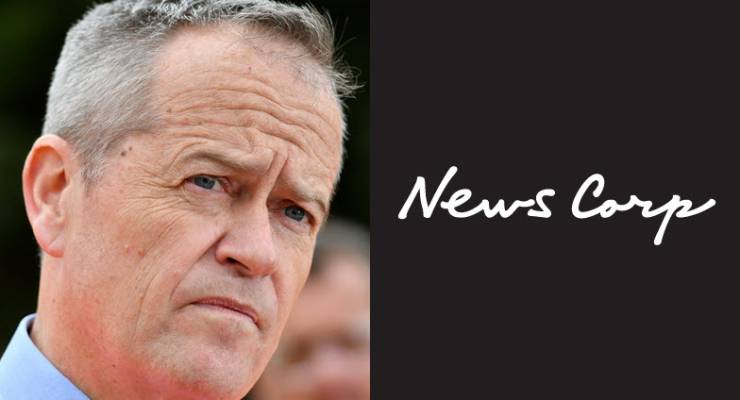
A week away from knowing who’s going to win Australia’s election, we already have a pretty good idea who’s lost: looks like it’s the US-owned News Corp.
Labor has sensed the moment, linking billionaires Palmer and Murdoch with Morrison. In the election play, Palmer is cast as the bumbling pantomime villain. Murdoch is cast as the Bond villain, a global spectre haunting Australia.
Palmer stands in for bosses who don’t pay their workers; News Corp for not paying Australian taxes (a claim followed up by the AFR on Friday).
The #billsmum front pages in the Daily Telegraph and Courier-Mail pose a surprising existential crisis for the company. It faces internal revolt and reputational damage that challenges its strategy to build profitability through reader revenues.
It is driving a recognition that News Corp in Australia has been following its US Fox sibling. It’s flipping from a journalism platform that, within the constraints of journalism campaigned for the right, to a campaigning platform that, with the constraints of their campaign, occasionally delivers some journalism.
You could sense the journalistic foot shuffling straight away. No-one suggested the front pages were journalism somehow gone unfortunately awry. It was acknowledged as a political hit job gone wrong. And with that came the almost light-bulb recognition that, increasingly, political hit jobs are what News Corp does.
Those News Corp targets who are less politically connected than the Shortens, many of them interviewed in Crikey‘s Holy Wars 2017 series on how The Australian targets and attacks its enemies, are entitled to feel aggrieved that it’s taken so long. But that moment of recognition is a pivotal moment in the destiny of the company.
A couple of weeks ago, The Monthly’s Richard Cooke challenged the long-standing “lots of good journalists in the company” defence. Sure. There are. Some of them are outstanding. But in the light of last week, journalists are now asking: how relevant is that good journalism to the company’s core purpose?
To remove any doubt, one of those good (actually, outstanding) journalists, the now-retired Tony Koch, blasted the “biased anti-Labor rubbish that, shamefully, the papers now produce on a daily basis”. The weekend before, The Australian’s columnist Alan Kohler said in a paywalled interview that the Murdoch media were “pumping up the Coalition”.
Koch’s reputation freed much of the rest of journalism’s elite to chime in, heads nodding.
In the hours after the Koch story, a recorded talk by another of the News Corp “good journalists”, Rick Morton emerged. “There is a real mood that something has gone wrong,” Morton told Sydney journalism students. “The craziness has been dialled up.”
This was followed by an impassioned Twitter debate between Morton and Cooke about the morality of working for News Corp, if (or even if) it provides the opportunity to do good through journalism.
The traditional Australian media has now arrived at the point that the Washington Post’s Margaret Sullivan reached back in March. Fox, she wrote, is “not a normal news organisation”. Rather, it is a “shameless propaganda outfit”.
More worrying for the company is what it means for revenues, as the mastheads have been sacrificing influence for money. As Koch said in his piece: “The Australian in particular was a big impact paper which regularly set the news agenda for media throughout the country.”
Now, sheltered behind its hard paywall, The Australian is apparently making money, but losing influence. Here, in the midst of a generational election campaign, The Australian is all but absent from public debate. Just about the only place you see their headlines is in Liberal advertisements.
Similarly, Sky News. Away from the Canberra bubble, where politicians and their staff get free Sky access, it’s struggling to make a mark. Yet only last election, the Sky News team won a Walkley Award for their political coverage.
News Corp hasn’t — so far — responded to the attacks. A couple of employees went on the offensive through tweets by The Australian’s Melbourne bureau chief, Chip Le Grand and a garbage truck gif from Rita Panahi. By Saturday, a few old hands like Chris Mitchell were making conciliatory noises.
But the real test will come after the election. How will journalism manage the recognition that, good journalists notwithstanding, News Corp is not a normal news organisation? Or will it be business as usual?








Crikey is committed to hosting lively discussions. Help us keep the conversation useful, interesting and welcoming. We aim to publish comments quickly in the interest of promoting robust conversation, but we’re a small team and we deploy filters to protect against legal risk. Occasionally your comment may be held up while we review, but we’re working as fast as we can to keep the conversation rolling.
The Crikey comment section is members-only content. Please subscribe to leave a comment.
The Crikey comment section is members-only content. Please login to leave a comment.